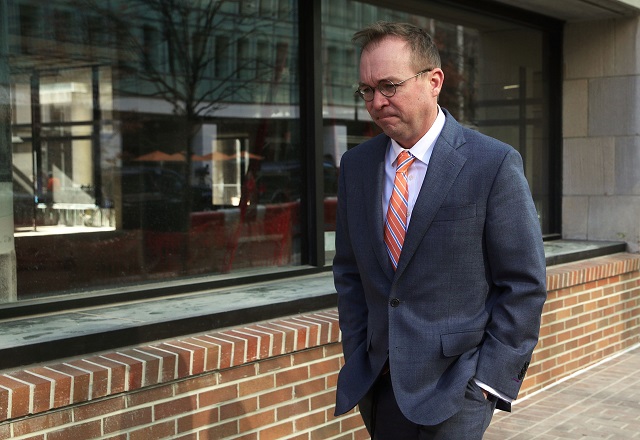
 White House Budget Director Mick Mulvaney, President Donald Trump’s pick for acting director of the Consumer Financial Protection Bureau, walks back to the White House from the CFPB building after he showed up for his first day of work on November 27, 2017 in Washington, DC. (Photo: Alex Wong / Getty Images)
White House Budget Director Mick Mulvaney, President Donald Trump’s pick for acting director of the Consumer Financial Protection Bureau, walks back to the White House from the CFPB building after he showed up for his first day of work on November 27, 2017 in Washington, DC. (Photo: Alex Wong / Getty Images)
Watchdogs’ worst fears about Mick Mulvaney undermining the Consumer Financial Protection Bureau are proving well-founded.
The interim CFPB director and top White House aide has asked for no additional money from the Federal Reserve for the next fiscal quarter, according to a Tuesday letter obtained by the conservative Washington Examiner.
Since the CFPB opened its doors earlier this decade, it has received on average roughly $500 million per year from the Fed, which oversees agency finances. The funds have been used to win about $2 billion per year for about 28 million consumers cheated by banks.
The budget request, or lack thereof, comes after Mulvaney announced a wider, all-encompassing review of the massively-popular agency.
It also comes days after Mulvaney announced he would issue waivers to regulations on payday loans, while opening the rules to reconsideration.
The rules were finalized in October under Obama-appointee Richard Cordray. They would force lenders to apply a “full-payment test” to determine if a borrower can actually afford to take out payday loans (the CFPB is prevented, by law, from setting maximum interest rates).
“The cycle of taking on new debt to pay back old debt can turn a single, unaffordable loan into a long-term debt trap,” the agency said, when issuing the final rule.
Even Republicans on Capitol Hill were hesitant to touch the rules, as they invoked the Congressional Review Act to annul another CFPB regulation completed last year. The so-called Forced Arbitration Rule would have guaranteed consumers the right to bring class action lawsuits against financial firms.
On Tuesday, progressive organizations denounced Mulvaney as a friend of loansharks and banking conglomerates. Public Citizen accused him of “inviting financial predators to help him dismantle consumer safeguards.”
“There is quite literally no reason to delay implementation of this rule — unless, like Mulvaney, you are more concerned with the needs of payday lenders than you are with the interests of the consumers these financial bottom-feeders prey upon,” said Karl Frisch, executive director of Allied Progress.
While in Congress, then-Rep. Mulvaney (R-S.C.) was one of the top recipients of campaign donations from payday lenders.
In November, after Cordray stepped down ahead of schedule, Mulvaney was appointed CFPB Director by President Trump on an interim basis. Mulvaney is also currently the head of the Office of Management and Budget — a powerful White House organ that issues veto threats and revises every major regulation across the Executive Branch.
Mulvaney’s temporary appointment has been challenged in court by Leandra English, a deputy director named acting CFPB head by Cordray just before the end of his term.
Though a District Court ruled last week in favor of the Trump administration, English is expected to appeal the decision, according to The Los Angeles Times.
Our most important fundraising appeal of the year
December is the most critical time of year for Truthout, because our nonprofit news is funded almost entirely by individual donations from readers like you. So before you navigate away, we ask that you take just a second to support Truthout with a tax-deductible donation.
This year is a little different. We are up against a far-reaching, wide-scale attack on press freedom coming from the Trump administration. 2025 was a year of frightening censorship, news industry corporate consolidation, and worsening financial conditions for progressive nonprofits across the board.
We can only resist Trump’s agenda by cultivating a strong base of support. The right-wing mediasphere is funded comfortably by billionaire owners and venture capitalist philanthropists. At Truthout, we have you.
We’ve set an ambitious target for our year-end campaign — a goal of $205,000 to keep up our fight against authoritarianism in 2026. Please take a meaningful action in this fight: make a one-time or monthly donation to Truthout before December 31. If you have the means, please dig deep.